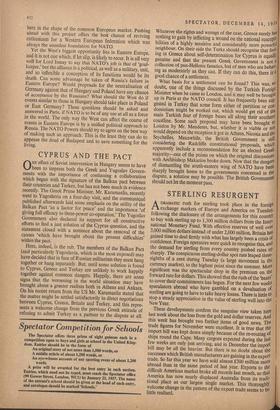CYPRUS AND THE PACT
ONE effect of Soviet intervention in Hungary seems to have been to impress both the Greek and Yugoslav Govern- ments with the importance of continuing a collaboration which began with the signature of the Balkan pact between their countries and Turkey, but has not been much in evidence recently. The Greek Prime Minister. Mr. Karamanlis, recently went to Yugoslavia on a four-day visit, and the communiqu6 published afterwards laid some emphasis on the utility of the Balkan Pact 'as a factor for peace' and the importance 'of giving full efficacy to three-power co-operation.' The Yugoslav Government also declared its support for all constructive efforts to find a just solution of the Cyprus question, and the statement closed with a sentence about the removal of the causes 'which have brought about the present difficulties' within the pact.
Here, indeed, is the rub. The members of the Balkan Pact (and particularly Yugoslavia, which is the most exposed) may have decided that in face of Russian militarism they must hang together or hang separately. But, until some solution is found to Cyprus, Greece and Turkey are unlikely to work happily together against common dangers. Happily, there are some signs that the worsening in the world situation may have brought about a greater realism both in Athens and Ankara. On his recent return from the US Mr. Karamanlis stated that the matter might be settled satisfactorily in direct negotiations between Cyprus, Greece, Britain and Turkey, and this repre- sents a welcome change from the previous Greek attitude of refusing to admit Turkey as a partner to the dispute at all. Whatever the rights and wrongs of the case, Greece surely has nothing to gain by inflicting a wound on the national suseeptP bilities of a highly sensitive and considerably more powerful neighbour. On their side the Turks should recognise that feel' ing in Greece about self-determination for Cyprus is equally genuine and that the present Greek Government is not 3 collection of pan-Hellenic fanatics, but of men who are behas" ing as moderately as they can. If they can do this, there is a good chance of a settlement.
What basis for a settlement can be found? This was. no doubt, one of the things discussed by the Turkish Foreign Minister when he came to London, and it may well be brought up in Paris at the NATO council. It has frequently been sug' gested in Turkey that some form either of partition or con' dominium might be worked out, which would get rid of the main Turkish fear of foreign bases all along their southern coastline. Some such proposal may have been brought to London by Mr. Menderes, but, whether it is viable or not would depend on the reception it got in Athens, Nicosia and the Seychelles. Meanwhile, the British Government is still considering the Radcliffe constitutional proposals, which apparently include a recommendation for an elected Grail majority—one of the points on which the original discussions with Archbishop Makarios broke down. Now that the dangers of dismantling the south-eastern wing of NATO have been sharply brought home to the governments concerned in the dispute, a solution may be possible. The British Government should not let the moment pass.










































 Previous page
Previous page